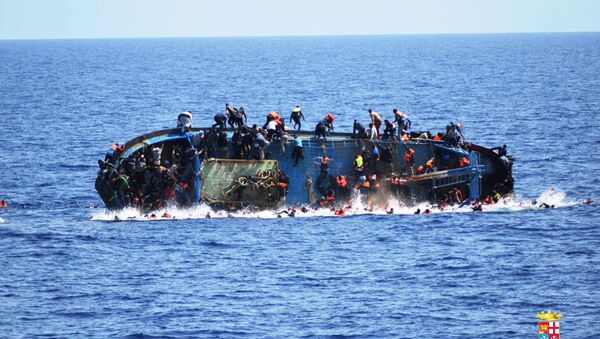Following the recent discovery of 120 bodies washed up on Libyan beaches, the International Organization for Migration (IOM) said 3,120 people had died trying to cross the Mediterranean in the first seven months of 2015, a jump from around 1,900 at the same point in time last year.
Deaths in the Mediterranean accounted for three-quarters of the world's migrant deaths so far this year, as asylum seekers continue to reach to try and reach Europe from Northern Africa.
257,186 migrants incl refugees arrived by sea to Europe
— IOM (@IOM_news) August 2, 2016
3,120 dead/missing https://t.co/Dc8umyVaTU #MigrationEurope pic.twitter.com/gb1tv0PEPy
Despite the sharp increase in migration deaths, flows of people making the journey across the Mediterranean have remained fairly steady, with an estimated 257,000 crossing the sea, compared to 220,000 last year.
Over 3000 migrant deaths in the #Mediterranean so far this year. 60% increase over last year. 87% are between #Libya & #Italy. (Source: IOM)
— James Wheeler (@wheelertweets) July 31, 2016
Of those, 94,000 landed in Italian ports, as the country becomes the main target for people looking to travel to Europe.
Officials say the increased use of rubber boats by people smugglers appears to be a major factor behind the sharp rise in the Mediterranean death toll in 2016.
Concerns Over Italian Route
The figures have raised concerns about the impacts of the EU's policies towards the migration crisis.
Following the establishment of the EU-Turkey migration deal, authorities in Greece have experienced a sharp decrease in the number of asylum seekers arriving from countries in the Middle East such as Syria and Iraq.
The EU- Turkey deal has not stopped Mediterranean deaths. In fact they have increased on the more dangerous routes. https://t.co/DGI64UDIRs
— Cindy Halmarson (@skbishopcindy) July 22, 2016
However, critics have argued the agreement with Ankara is not addressing the cause of the migration problem and not adequately cracking down on people smuggling, which could exacerbate the situation in North Africa and Italy.
Italian officials have recorded a sharp increase in the number of Nigerian women entering the country compared to last year, with the IOM estimating 80 percent of those are the victims of trafficking.
German govmt spokesman: We stand by the EU-Turkey deal #Turkey #EU #Berlin
— Naomi Conrad (@NaomiConrad) July 22, 2016
"Many of them come from the Edo region, where they are lured into enslavement and subjected to voodoo rituals to brainwash them into accepting their fate. They believe that any attempt to escape or rebel against their traffickers will cause harm to them and their families," IOM Rome spokesperson Flavio Di Giacomo said.
While EU vessels have been patrolling the North African coast to try and help those in danger, officials in Brussels have put forward proposals aimed at preventing people from making the dangerous voyage across the Mediterranean.
EU adopts new measures worth €27.5 million for migration programmes in North Africa https://t.co/tkkuPd8mPN via @EU_Commission
— Melissa Julian (@MJulianECDPM) July 1, 2016
The EU has proposed making it easier for skilled African migrants to obtain work visas in the bloc, while it has been suggested that African nations that cooperate with the EU could be rewarded with aid or favorable trade deals.


